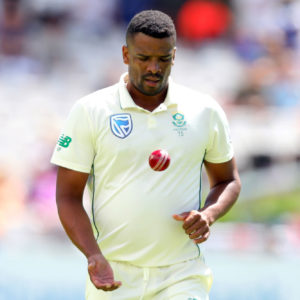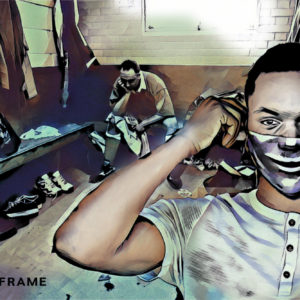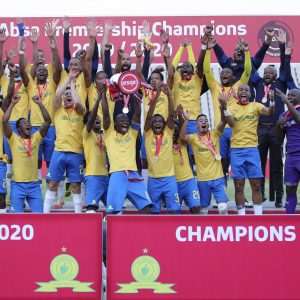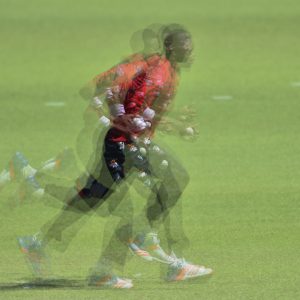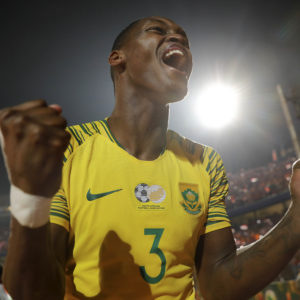Nathan Paulse is reshaping SA’s football narrative
Starting XI Revolution offers professional and amateur footballers peer-to-peer mentoring to deal with off-field challenges and help them avoid the pitfalls of the lifestyle.
Author:
30 October 2021

Nathan Paulse is tired of tales about South African footballers whose misguided lifestyles cost them everything. Fuelled by his peers’ woes and helped by some of South African football’s biggest names, the former Ajax Cape Town (now known as Cape Town Spurs) striker has founded Starting XI Revolution (SXIR). This mentoring service teaches footballers to manage their lives off the field.
SXIR offers two mentoring series: The Next Level for professionals and The Pursuit for young amateur and academy players aged 16 and older. Each series consists of seven sessions, with classes for professionals taking place twice a week and those for amateurs on a weekly basis.
Initially, Paulse did all the mentoring himself along with guests, but SXIR has grown. Paulse also capitalised on the initial stringent Covid-19 lockdown to expand SXIR’s list of mentors while football was on pause. Hlompho Kekana, Cole Alexander, Brandon Petersen, Bevan Fransman, Abel Mabaso, Eleazar Rodgers, Joslin Kamatuka and Roscoe Pietersen joined him.
Related article:
Paulse, a one-cap Bafana international, retired as a player for the second time in 2019. He spent the bulk of his career at Ajax, having also turned out for Avendale Athletico, Hammarby in Sweden, Bloemfontein Celtic, Platinum Stars and SuperSport United. He initially retired in 2017, but came back after a year to spend the 2018-2019 season at Cape Umoya United.
In many respects, Paulse avoided the potential pitfalls of professional football. He was seldom the most breathtaking player on the pitch, but his consistency enabled him to play professionally for the better part of two decades. This he attributes to a childhood spent in a stable home with solid values, and a father who was a former school headmaster to help keep him on track.
Although he had a support structure off the field, Paulse felt alone on it for much of his career. He carried insecurities that stemmed from being booed regularly in his formative years as a player, making it difficult to enjoy his football. A psychologist helped him deal with this.
Related article:
“It was quite a simple tool which he showed me. You have to accept that the only person that you can control is you,” Paulse says. “For me, those first three or four years, I was so nervous and wanted to control how the fans were going to react to me. Everything I was doing was always about how someone else was going to react to me.”
Paulse, who served as Spurs’ assistant coach under Ian Taylor before resigning when his boss was sacked in April, still has imperfections and insecurities, but these days he is bold enough to wear them on his sleeve. By his own admission, he has had to overcome his fear of public speaking. He stammers and tends to go off on tangents.
Even so, he was brave enough to lay the foundations for SXIR and the mentoring series have proved a hit among amateur and professional footballers. Classes are conducted in small groups, where participants are encouraged to share information among themselves. Through allowing himself to be vulnerable in this space, even one of South African football’s strongest characters lifted a weight off his shoulders.
Helped by helping
Former Mamelodi Sundowns captain Hlompho Kekana is among the most decorated footballers in the country, but life at the top can be lonely even for the affable midfield maestro.
“For me, it was an eye-opener to share things about myself with the guys in my space. I remember I told them that there are things in my football career that I can’t talk about with my mom, because she will never understand,” says Kekana of his experience taking The Next Level course.
Related article:
“At the same time, [I told them] it would be nice to share with somebody some of those things that I need to share. With the guys in that course, I think it was nice to have a conversation about our football and the things we loved doing. We shared a lot of things and I enjoyed that space.”
Kekana spent a year as a mentor to fellow professionals with SXIR before reaching a point after the lockdown eased where his schedule no longer permitted this. All the other players have remained in the programme. For Kekana, this project was part of what he had always viewed as his wider purpose within the game. “Talking to youngsters has been my goal since I started playing football,” he says. “I know what it takes for a young kid to believe that he can make it. You just need somebody to talk to [who can] give you that hope that it is really possible.”
Rise, fall and rebirth
There can be moments in a footballer’s journey during which they begin to doubt their future as a player. For Chippa United defender Pietersen, rock bottom came when he had to go for a third knee operation before he’d even turned professional.
“It’s not that I doubted my ability or anything, I just felt that maybe football wasn’t for me,” Pietersen says. “When I suffered my third knee injury, I thought that was it, I was done with football. I was very blessed to have a good support structure at the time. After the third op, I was convinced to give it one more go. Do proper rehab and take it from there. Like they say, ‘The rest is history.’”
Pietersen scrapped his way into top-flight football with the Chilli Boyz, who were promoted to the premier division in 2012. That same year, SuperSport signed him and it seemed there was light at the end of the tunnel. His hopes were dashed, however, when he seriously injured his knee yet again while at Matsatsantsa.
Related article:
Still, Pietersen refused to throw in the towel. After loan spells at AmaZulu and Vasco da Gama, he moved to Ajax and featured regularly from 2016 until their 2018 relegation. He then moved to Cape Umoya and at 32, he lives to fight another day back where it all started at Chippa.
Perhaps unsurprisingly, after so many setbacks, Pietersen has endured a lengthy struggle with his own temper. Now, with the help of SXIR, as well as Sports Chaplaincy South Africa national director Bruce Nadin, he says he has got it under control.
“It was something I struggled with throughout my career. I’ll say both SXIR and being under Bruce Nadin’s mentoring helped me with this issue, Bruce on the spiritual side and SXIR on the practical side,” he says.
Lessons from the journey
Pietersen has taken a leaf out of Paulse’s book and begun to focus only on what he can control. He and former Cape Umoya teammate Kamatuka were the first two SXIR mentors to join Paulse. For an aspiring professional footballer, there is as much to learn from Pietersen’s story of setbacks and comebacks as there is from Kekana’s rise and success.
SXIR does not offer a one-size-fits-all answer to every off-field problem a footballer could face. All of the mentors at the moment are current or former professional footballers, and Paulse uses external industry experts only on an ad-hoc basis.
Related article:
Even so, as South Africa ushers in a new generation of players, at least they now have the option of investing in an off-field football education inspired by the highs and lows of those who came before them.

